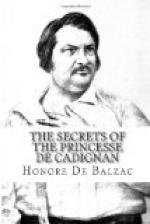For several years the crushing toil by which he prepared the solid ground of his subsequent works, and the chill of poverty, were marvellous preservatives. But when ease with his inherited fortune came to him, he formed a vulgar and most incomprehensible connection with a rather handsome woman, belonging to the lower classes, without education or manners, whom he carefully concealed from every eye. Michel Chrestien attributed to men of genius the power of transforming the most massive creatures into sylphs, fools into clever women, peasants into countesses; the more accomplished a woman was, the more she lost her value in their eyes, for, according to Michel, their imagination had the less to do. In his opinion love, a mere matter of the senses to inferior beings, was to great souls the most immense of all moral creations and the most binding. To justify d’Arthez, he instanced the example of Raffaele and the Fornarina. He might have offered himself as an instance for this theory, he who had seen an angel in the Duchesse de Maufrigneuse. This strange fancy of d’Arthez might, however, be explained in other ways; perhaps he had despaired of meeting here below with a woman who answered to that delightful vision which all men of intellect dream of and cherish; perhaps his heart was too sensitive, too delicate, to yield itself to a woman of society; perhaps he thought best to let nature have her way, and keep his illusions by cultivating his ideal; perhaps he had laid aside love as being incompatible with his work and the regularity of a monastic life which love would have wholly upset.
For several months past d’Arthez had been subjected to the jests and satire of Blondet and Rastignac, who reproached him with knowing neither the world nor women. According to them, his authorship was sufficiently advanced, and his works numerous enough, to allow him a few distractions; he had a fine fortune, and here he was living like a student; he enjoyed nothing,—neither his money nor his fame; he was ignorant of the exquisite enjoyments of the noble and delicate love which well-born and well-bred women could inspire and feel; he knew nothing of the charming refinements of language, nothing of the proofs of affection incessantly given by refined women to the commonest things. He might, perhaps, know woman; but he knew nothing of the divinity. Why not take his rightful place in the world, and taste the delights of Parisian society?
“Why doesn’t a man who bears party per bend gules and or, a bezant and crab counterchanged,” cried Rastignac, “display that ancient escutcheon of Picardy on the panels of a carriage? You have thirty thousand francs a year, and the proceeds of your pen; you have justified your motto: Ars thesaurusque virtus, that punning device our ancestors were always seeking, and yet you never appear in the Bois de Boulogne! We live in times when virtue ought to show itself.”
“If you read your works to that species of stout Laforet, whom you seem to fancy, I would forgive you,” said Blondet. “But, my dear fellow, you are living on dry bread, materially speaking; in the matter of intellect you haven’t even bread.”




